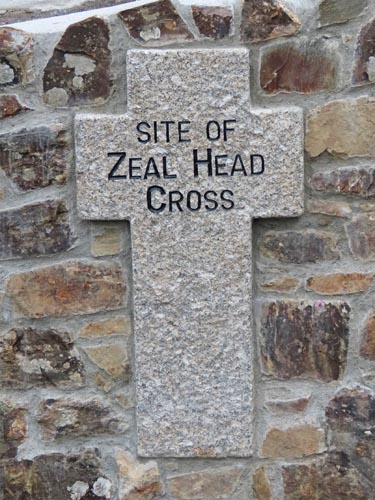| Zeal Head Cross |
 Location: Built
into the garden wall of a property at Zeal Head Crossroads, South Zeal. Location: Built
into the garden wall of a property at Zeal Head Crossroads, South Zeal.O/S Grid Ref: SX/64832/93765 Longitude/Latitude (Degrees+/-): -3.91650/50.72773 Map location: Click here to view map. Purpose: The cross marks the spot where an ancient waymarking cross once stood. Size: The cross is 3 feet 2½ inches (0.98 metres) high and 1 foot 9 inches inches (0.53 metres) across the arms. The width of the shaft measures 11 inches (0.28 metres). Information: This
modern Latin cross has been built into the garden wall of a property on
the corner of the Zeal Head Crossroads at the north-western
end of South Zeal village. The cross protrudes slightly from the
wall and, because the wall leans slightly inwards, the top of the cross The cross has been incised with the wording: "SITE OF ZEAL HEAD CROSS", which has been painted over in black to emphasise the wording. William Crossing, in his book 'The Ancient Stone Crosses of Dartmoor' (page 126) states that an ancient cross once stood at this site which was known as Townsend (Town's End), or Zeal Head Cross. He went on to say that the original cross was destroyed, long before his visit, by John Orchard who was afterwards hanged, not for this act of vandalism but for forgery. In 1827, there was a case heard at the Exeter Court where two men, father and son, who were both named John Orchard, of Ford Farm South Zeal, were jointly accused of forgery. It seems as though John Orchard junior had been trying to obtain a loan of £1,000 in order clear their debts and to help his father who had become elderly and infirm. Having no collateral with which to secure a loan, John junior found himself unable to find anyone to lend his father the money. He then set to work in forging the deeds of Ford Farm to show that it was owned by his father. The false deeds were used to secure a loan of £1,000 from a Mrs Lane, who then supposedly held the property in trust. Although the loan was arranged through a solicitor, the paperwork that John junior had produced must have appeared authentic enough to seal the transaction. Over time it was realised that not only had the Orchard's not made any payments of interest but had also managed to obtain further loans on the property using forged documents. During the course of the trial, it became obvious that John Orchard senior was completely unaware of what his son had done on his behalf, probably due to his age and infirmity, and the jury returned a verdict of not guilty for him. However, John Orchard junior was found guilty of forgery and was duly sentenced to death by hanging by the judge, Justice Burrough.
|